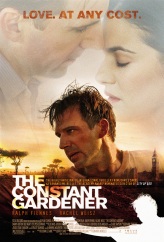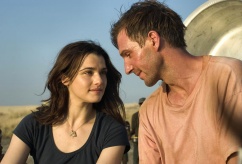| The Constant Gardener |
| |
 |
UK/USA, 2005. Rated R. 129 minutes.
Cast:
Ralph Fiennes, Rachel Weisz, Danny Huston, Bill Nighy, Humbert Koundé, Pete Postlethwaite
Writer: Jeffrey Caine, based on the novel by John le Carré
Original Music: Alberto Iglesias
Cinematography: César Charlone
Producer: Simon Channing Williams
Director: Fernando Meirelles
LINKS |
Read AboutFilm's interview with Fernando Meirelles.
 ohn Le Carré stories are not your typical espionage thrillers. As the films based on his works (The Spy Who Came in from the Cold, The Russia House, The Tailor of Panama) demonstrate, Le Carré is concerned more with character than with suspense. That's not to say his stories aren't suspenseful, but for him espionage is an unsavory business that devours its participants.
ohn Le Carré stories are not your typical espionage thrillers. As the films based on his works (The Spy Who Came in from the Cold, The Russia House, The Tailor of Panama) demonstrate, Le Carré is concerned more with character than with suspense. That's not to say his stories aren't suspenseful, but for him espionage is an unsavory business that devours its participants.
The difficulty with The Constant Gardner is that Oscar-nominated director Fernando Meirelles (City of God) isn't interested in either character or suspense. He's interested in political issues and the scenery. The primary issue The Constant Gardener confronts—Third World exploitation by profiteering pharmaceutical companies—is certainly meaty and one not seen addressed in film before, but—Hey, look at the pretty flock of birds flying over the salt flats!
The film's unevocative title refers to the fact that Justin (Ralph Fiennes), assigned to the British High Commission in Kenya (what UK Embassies are called in Commonwealth countries), whiles away time in his garden while his young wife Tessa (Rachel Weisz of Constantine and The Mummy) is out doing dangerous AIDS relief work with Dr. Arnold Blum (Humbert Koundé). The title may also indirectly refer to the expression used in the British Foreign Service to describe the idle time between postings—gardening leave.
The flashback-heavy film opens with a parting. Tessa takes her leave of Justin and gets on a plane. It's the last time they see each other. Justin receives the bad news from his friend Sandy (Danny Huston of Birth) while he waters his plants. A white woman was found with a black companion in an unexpected location. According to reports, the two had shared a room the night before. Justin greets the news of his wife's apparent infidelity and death with a stiff upper lip. When they go to identify Tessa's horribly burned body, it's Sandy who reacts by vomiting and Justin who comforts him.

Rachel Weisz and Ralph Fiennes star in The Constant Gardener. |
In other words, Justin is a proper reserved Englishman. Fiennes specializes in these cold-fish characters with hidden passions, playing such men in The English Patient and The End of the Affair. Even his monstrous concentration camp commander in Schindler's List fits the bill. Justin becomes determined to investigate Tessa's death, and won't be dissuaded by threats or even common sense. A constant gardener can also mean a loyal gardener, and that's who Justin learns to be as he uncovers the secrets that got Tessa murdered.
The villains here are Big Pharma, and many abuses can be laid at their feet. It's true that they manufacture life-saving drugs. It's true that they invest billions in developing more. And it's true that a private-sector business deserves a return on investment. But their business practices would make an arms dealer squeamish. Critics argue that Big Pharma are profiteers who ignore humanitarian need, and that the earnings go to funding massive marketing campaigns rather than research, which is often subsidized by public funds. For Meirelles, who is Brazilian, taking on Big Pharma is was what attracted him to The Constant Gardener. Brazil has butted heads with Big Pharma and rich-world governments over a Brazilian law that requires the government to provide low-cost AIDS treatment to its entire population. (Brazil ultimately faced trade sanctions by violating drug patents in order to produce its own generics.) The Constant Gardener portrays Big Pharma taking advantage of Africa's widespread plagues of AIDS, malaria, and tuberculosis to use Africans unscrupulously as guinea pigs, and all of Kenya as a laboratory.
Meirelles and screenwriter Jeffrey Caine too often get lost in the intricacies of the political issues, however. They've pared away a great deal of Le Carré's thick novel, but even more needed to be cut. The story is difficult to follow and sometimes crowds out the emotional elements. Compounding matters, Meirelles has a poor instinct for character when he does decide to examine it. He quite seriously considered casting a teenager as Tessa, before he finally realized that no teenager would have Tessa's resourcefulness and strength of purpose. As he explained in a recent interview, he thought the love story would have been more interesting with a teenager. Ick. There's already a notable age difference between forty-two year old Fiennes and thirty-four year old Weisz, and Weisz is playing a twenty-four year old. There's still plenty of room to explore the complexities of relationships between older men and younger women, a subject so rarely addressed in film.
To be fair, some age difference is necessary to this story. It helps to explain the wall between Justin and Tessa. They lack passion because they never really had any. In a flashback, their relationship begins as a casual liaison that becomes suddenly serious when the idealistic Tessa asks Justin to take her to Africa, where she immediately involves herself in social work and makes herself a nuisance to the local authorities. Justin knows Tessa is up to something and believes he is losing her, but did he ever have her?
Meirelles' instincts work far better in crafting the film's atmosphere. Though he devotes way too much time to setting and mood, his stylistic choices are all impeccable. Meirelles goes for a hyper-realistic feel, shooting most of the film on location in Kenya and incorporating numerous hand-held sequences. In one, he follows Fiennes into the Kibera slum, where he asks people if they have seen a boy named Kioko. Of course they haven't; these are real people (not extras) unaware they are on film, and Kioko is a character in the story. For the scenes in the UK, Meirelles exploits the fact that there are cameras everywhere (some statistics suggest that the average Londoner is captured on camera dozens of times each day) to create paranoia. The realism extends to Weisz's pregnancy—a prosthetic and makeup job so good that you can't believe she isn't.
The Constant Gardener winds up a bit of a mixed bag that you want to like more than you actually do. Admirably performed and admirably shot, The Constant Gardener is an admirably courageous film admirably confronting important issues. There's nothing wrong with Justin's powerful story arc, either. Nevertheless, the film remains slightly distant and dispassionate, like Justin himself at the start. Perhaps an admirable, important film is not the same thing as a totally gripping and absorbing one.
Review
© October 2005 by AboutFilm.Com and the author.
Images © 2005 Focus Features. All Rights Reserved.


